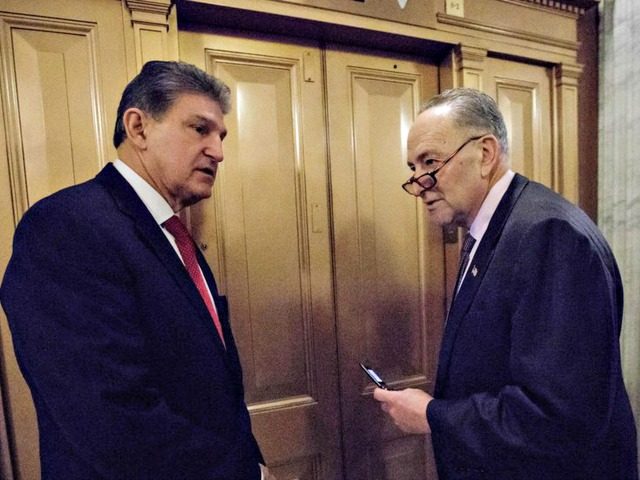Closing the carried interest loophole could jeopardize the Democrat reconciliation bill, as some Democrats have fought for an exemption for startups.
Senate Majority Leader Chuck Schumer (D-NY) and Sen. Joe Manchin (D-WV) unveiled the Inflation Reduction Act, a Democrat reconciliation bill that aims to reduce the deficit, extend enhanced Obamacare subsidies, and advance climate change programs.
To raise revenue for the Democrats’ reconciliation bill, the legislation would also create a 15 percent corporate minimum tax, allow Medicare to negotiate the price of drugs, increased IRS tax enforcement, and close the carried interest loophole.
The carried interest “loophole” lets private-equity firms pay lower taxes by letting these firms access a tax-advantaged treatment on their performance pay, or carried interest. This is usually set at 20 percent of the returns they generate for their investors, rather than the ordinary income of 37 percent.
Under the Inflation Reduction Act, the bill would close the loophole and instead treat carried interest as regular income rather than capital gains. This aims to raise $14 billion to fund the Obamacare and climate change portions of the bill. The bill, however, stipulates that those making less than $400,000 would be exempt from the loophole’s closing.
Closing the carried interest loophole may spell problems for many Senate Democrats that have opposed closing the loophole without exemptions.
Sen. Kyrsten Sinema (D-AZ) did not want to alter the carried interest loophole when negotiating the Build Back Better legislation.
“We do not have a comment, as she will need to review the text,” a spokesperson for Sinema said at the time.
Four Senate Democrats also raised issues with closing the carried interest loophole during past tax legislation negotiations.
Sens. Patty Murray (D-WA), Mark Warner (D-VA), Bob Casey (D-PA), and Jeanne Shaheen (D-NH), said in 2010 that subjecting venture capital firms to higher taxes on carried interest would hurt job creation and “could not occur at a worse time.” The Democrat senators were referencing America at a time when it was just recovering from the 2008 financial crisis; Democrats remain poised to raise taxes on Americans with this reconciliation package as America just moved into a recession.
“We encourage you to include language in any carried interest provision that maintains a capital gains incentive for those who contribute to the viability of our start-up community — venture capitalists,” the senators wrote at the time.
The American Investment Council, a lobbying group for the private equity industry, said that private equity investment goes to small businesses.
“Over 74% of private equity investment went to small businesses last year. As small business owners face rising costs and our economy faces serious headwinds, Washington should not move forward with a new tax on the private capital that is helping local employers survive and grow,” Drew Maloney, the group’s president and CEO, said in a statement.
Sean Moran is a congressional reporter for Breitbart News. Follow him on Twitter @SeanMoran3.

COMMENTS
Please let us know if you're having issues with commenting.